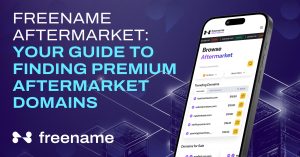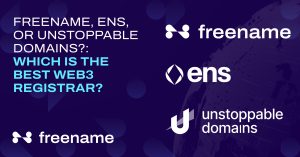Often described as the “decentralized web,” Web3 promises to revolutionize how we interact online by shifting control from centralized entities to individuals and communities. Therefore, businesses need to improve their SEO marketing on web3 to stay ahead of the competition.
The Web2 SEO is going through a continuous change as the Web2 policies are changing. It’s more focused on adhering to the rules and regulations stipulated by search engines and browsers. With Web3, there are new challenges ahead, and traditional SEO practices need to transform big time.
So, how does SEO for Web3 work? How can you implement it to reap the benefits of this blockchain-based internet? Let’s dig in to find out.
What Is Web3 and How Does It Impact SEO?
Web3 represents the next stage of internet evolution, where decentralization empowers users by redistributing control from centralized entities to individuals.
The traditional internet, Web2, is largely controlled by giants like Google, Facebook, Amazon, etc. But, Web3 operates on decentralized networks powered by blockchain technology. In this ecosystem, users have greater control over their data, transactions are more transparent, and intermediaries are minimized.
This is the core reason why more and more businesses are switching to Web3. Another reason is that it is easier to operate in the Web3 landscape as the competition is less stiff. You can easily buy a domain that represents your core business, products and the value you offer.
To capture your customers, you need a strong understanding of Web3 SEO. Here, you’ll find all the answers related to SEO for Web3.

Web3 vs. Traditional SEO
In Web2, SEO revolves around centralized algorithms and platforms that determine content visibility. These platforms store data on centralized servers, analyze user behavior, and rank content accordingly.
At present, there are quite a few challenges that traditional SEO needs to address, for example:
- Lack of transparency in ranking algorithms
- Centralization of search engines
- Complications in attribution and analytics due to the changes in browser policies and privacy regulations.
- Manipulative link-building and private blog networks (PBNs); hard for Google to detect
- Content authenticity and Plagiarism
This is where blockchain-based internet is different. It offers complete data ownership and involves network users to verify, index, and rank search results. The key attributes of this paradigm shift include:
- Your data is stored on decentralized networks instead of centralized servers. This not only adds a layer of security but also prevents crawling and indexing tactics used by traditional search engines.
- Content is ranked by network users. While networks do feature algorithms and protocols, content validation and indexing is done by the users. This is unlike centralized algorithms like PageRank by Google.
- User Control: Users in Web3 ecosystems have more control over the content they consume, which could affect how SEO marketers approach audience targeting and engagement.
In the future, we may see blockchains improving transparency with respect to search and ranking algorithms – something that Google hasn’t done yet. We may see open-source algorithms or more user-centric algorithms in the future.
The Role of Blockchain in SEO Practices
Considering the above, blockchain can help revolutionize the way SEO works. Blockchain have decentralized ledgers to validate content authenticity.
They offer backlink integrity, making sure there are no black-hat tactics involved. They also provide insights into the user engagement a particular platform, website or product has generated over time.
In short, blockchain can help level the playing field for all businesses.
Key Changes in SEO for Web3
Owing to its decentralized nature, Web3 will surely change the way traditional SEO works. You can expect the following changes in the Web3 SEO:
Ranking Factors May Change
Moving into the Web3 world, traditional website ranking factors, such as backlinks, content quality and uniqueness, domain authority, and keyword optimization, may change. SEO experts may need to consider the following factors:
- Verified transactions and tokens: A powerful blockchain validation factor that may influence content visibility.
- More Search Engines: In the Web3 landscape, Instead of relying on Google, users may turn to decentralized alternatives like Presearch or The Graph, which operate without central oversight.
- Token-Based Content Models: Engagement could be incentivized with tokens, rewarding users for interacting with content.
User Experience Redefined
Web3 prioritizes user privacy and autonomy, shifting the focus from passive browsing to active participation. For SEO, this means:
- Content must cater to privacy-conscious users who value transparency.
- Personalized experiences will rely on consensual data sharing rather than tracking cookies or intrusive analytics.
For example, if you have a system allowing users to pay with domains without compromising the safety and security of their online identity, it’ll surely improve their experience.
This is where Freename.io can help you. It can help redefine the customer experience by offering highly functional and dynamic domains that can be linked to your digital wallets or other digital assets. Even better, you can integrate a single domain into all your assets for an effortless transaction.
Decentralized Reputation Systems
Web3 introduces reputation systems powered by blockchain, where user reviews and feedback are transparent and immutable. Web3 domains with strong reputations in these systems will naturally attract more visibility, further aligning with ethical SEO practices.
Strategies for Optimizing SEO in the Web3 Era
To thrive in this decentralized environment, businesses must adopt forward-thinking strategies. Here are some strategies to boost your SEO marketing on Web3:
1. Decentralized Content Distribution
Traditional platforms like WordPress or Medium may give way to decentralized alternatives such as IPFS (InterPlanetary File System). Publishing content on these platforms can enhance discoverability in a Web3 ecosystem.
2. Leveraging Blockchain for Trust
Blockchain can validate claims made in your content, ensuring transparency and credibility. For example:
- It lets you use blockchain-based certificates to verify product authenticity.
- It records key milestones, such as sustainability efforts, on the blockchain to build consumer trust.
3. Reputation Systems Build Credibility
Participating in decentralized review systems can bolster your brand’s reputation. Encourage satisfied customers to leave reviews on blockchain-based platforms, which will serve as an immutable testament to your business’s quality.
4. Integrating NFTs and Smart Contracts
Non-fungible tokens (NFTs) and smart contracts present unique opportunities for SEO marketing:
- Use NFTs to create exclusive content or rewards for loyal customers.
- Implement smart contracts for transparent affiliate marketing campaigns, ensuring all parties are fairly compensated.
5. Optimizing for Decentralized Search Engines
As decentralized search engines gain popularity, ensure your content is optimized for these platforms. This includes using semantic metadata and participating in token-based ecosystems where visibility is rewarded through community engagement.
The Future of SEO Web3
The future looks brighter with Web3 moving steadily to become mainstream. There will be several new trends that will shape the future of SEO marketing for Web3. Some key attributes include:
1. AI-Driven Algorithms
Artificial intelligence (AI) will play a critical role in decentralized search engines, analyzing data in ways that prioritize relevance, transparency, and user preferences without sacrificing privacy.
2. Privacy-First SEO Strategies
With Web3 emphasizing user privacy, SEO strategies must adapt to non-invasive methods of engagement. This could involve blockchain-based analytics tools that provide insights without compromising user data.
3. Rise of Decentralized Search Engines
Decentralized search engines will challenge the dominance of traditional platforms. Businesses will need to understand how these systems rank content and adapt their strategies accordingly.
4. Greater Focus on Community Engagement
Web3 empowers communities, making engagement a cornerstone of visibility. SEO marketers will need to actively participate in community-driven platforms, fostering trust and dialogue with users.
Conclusion
Web3 SEO practices will be different from the ones we see on the traditional web. That’s because the blockchain-based web has redefined the way users engage with each other. There are no central entities or controlling authorities to dictate terms. Moreover, the decentralized infrastructure has a larger room for adaptation and innovation.
SEO for Web3 will not be the same because it won’t be dealing with search engines or central servers. It needs to improve and focus more on content quality, ethical linking, and blockchain reputation building. Understanding blockchain ledgers and the information they provide will also help set the direction. The future of SEO is decentralized, transparent, and community-driven—offering exciting opportunities for those willing to embrace the change.
To make your presence felt on the decentralized web, you need a Web3 domain. You can buy domain from Freename, one of the most reliable service provider in the digital landscape. From domain hosting to minting and managing your digital assets, Freename offers complete assistance, and even helps you trademark your identity, making it safe.
FAQs
What is web3 SEO?
It’s the process of optimizing Web3 assets, especially websites, to gain visibility on the decentralized web. SEO for Web3 is different from traditional SEO, which is focused on centralized search engines. Web3 SEO is more about creating strategies to comply with decentralized networks that offer better transparency, privacy, and unrestricted content distribution.
SEO marketing in the Web3 space must consider new ranking factors, including token-based engagement, ledger-based validation, and decentralized reputation systems.
Can I rank my Web3 website in Google?
Yes, as Web3 is aligned with traditional search engines. However, you need to integrate traditional SEO practices with your overall SEO marketing for Web3. This may include:
- Keyword optimization and content quality
- Ensuring that visitor access through traditional web browsers
- Utilizing metadata and structured data for better indexing.
What are the best web3 SEO strategies
Here are some effective strategies for Web3 SEO:
- Host content on platforms like IPFS or Filecoin for credibility and accessibility.
- Use blockchain to validate data, reviews, and transactions, demonstrating transparency and earning user trust.
- Use NFTs for exclusive content or promotions and smart contracts for affiliate marketing or loyalty programs to attract targeted audiences.
- Implement token-based reward systems to incentivize users. This will improve user engagement.
- Utilize popular Web3 platforms like Presearch and participate in community-driven discussions. Use semantic metadata to improve your rankings.
- Adapt to the privacy-centric nature of Web3 by using analytics tools that respect user data and prioritize consent-driven marketing.







